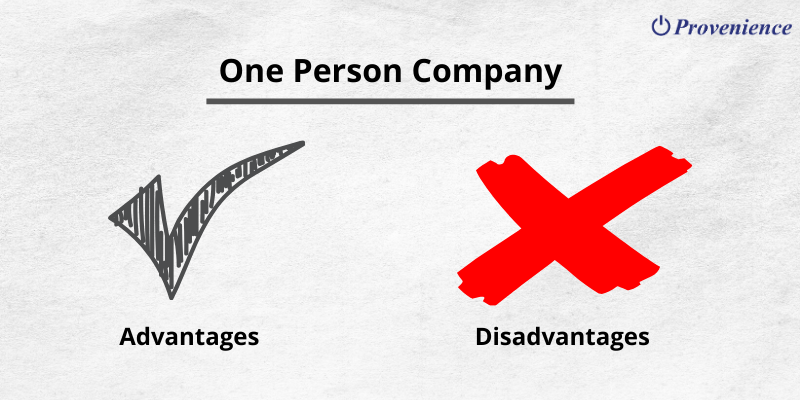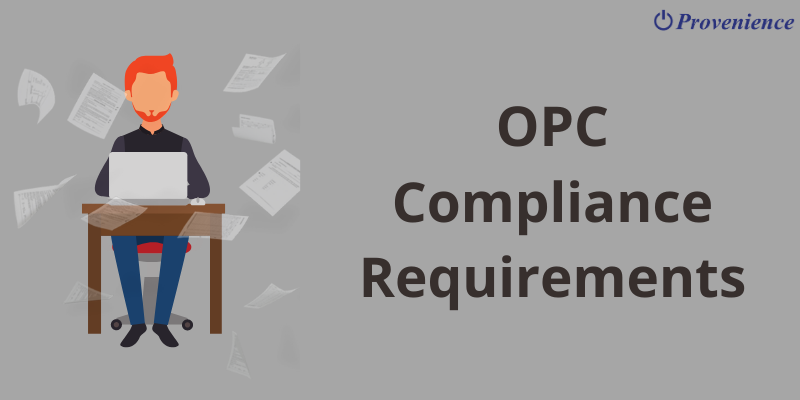Before the Companies Act, 2013 introduced a One Person Company (OPC), a single person could not set up a company. The only option he had was to start a sole proprietorship without a separate legal status of the business. While the concept of an OPC was already popular in several other countries, in India, it was introduced in 2014. Digitization was creating new and emerging sectors and startups were mushrooming all across the country. With an OPC, these companies got an option to participate in the economic growth of the country. Like most other business entities, an OPC has certain pros and cons too. Today, we will talk about OPC advantages and disadvantages to help you decide if this is the right structure for your business.

Advantages of a One Person Company
As we mentioned before, like all other types of business entities, an OPC has certain plusses and minuses. Here is a quick look at OPC advantages:
OPC Advantages #1. Compliance-related Exemptions
As per the provisions of the Companies Act, 2013, an OPC must comply with all the compliance requirements of a private limited company. However, the government has provided many compliance-related exemptions to one-person companies, making it easier for OPCs to manage their business.
OPC Advantages #2. Limited Liability
Earlier, single persons looking to register a business would opt for a sole proprietorship. However, the liability was unlimited that up the business owner’s personal assets at risk if the business suffered losses. However, in an OPC set-up, the liability of a shareholder is limited to his shareholding. Therefore, even if the business suffers losses, the personal assets of the owner are not at risk.
OPC Advantages #3. Basic Eligibility Criteria
The eligibility criteria for registering an OPC are as follows:
- At least one Director and only one shareholder (same or different persons)
- One nominee
- When paid-up capital > Rs.50 lakh and turnover >Rs. 2 Crores, you need to mandatorily convert the OPC to a private limited company
OPC Advantages #4. Social Recognition
For all practical purposes, an OPC is like a private limited company. People bestow a lot of trust in a private limited company making it easier to trust an OPC. Even during B2B (business-to-business) dealings, larger corporations prefer a company structure to a sole proprietorship. Also, being socially accepted allows you to attract quality talent and create an efficient talent pool.
OPC Advantages #5. Continuity of Business
It is mandatory to appoint a nominee while incorporating a one-person company as a sole member. This ensures that in case the member becomes incapable of entering into a legal contract, the nominee takes care of the proceedings. The incapability can result from the death or physical/mental disability of the member. It helps the company stay in business ensuring continuity.
OPC Advantages #6. Easier Loans
As compared to a general partnership or sole proprietorship, an OPC is preferred by banks for loans. This is because it has the structure of a company. The structure of a company is transparent and its perpetual succession ensures that the bank doesn’t suffer losses in any scenario.
OPC Advantages #7. Efficient Management
In the case of an OPC with a single director, management is more efficient since there is a single decision-maker. However, the sole member can appoint more directors for administrative functions.
OPC Advantages #8. Lesser Compliances
As compared to a private limited company, an OPC has lesser compliance requirements. An OPC needs to conduct at least one board meeting in each half of a calendar year (one between January-June and one between July-December). However, if the OPC has a single director, then he can pass a resolution without a meeting and enter the details in the minutes’ book.
Disadvantages of a One Person Company
Here is a quick look at OPC disadvantages:
#1. Not suitable for large businesses
If the paid-up capital of an OPC exceeds Rs.50 lakh and its annual turnover exceeds Rs.2 crore, then the OPC needs to mandatorily convert into a private limited company. Hence, while small businesses can benefit from it, the structure is not suitable for the larger ones.
#2. Restrictions on business activities
You cannot incorporate an OPC under Section 8 of the Companies Act, 2013. Also, you cannot convert your OPC into a company under the said section. Further, an OPC cannot involve itself in non-banking financial investment activities.
#3. Taxation
Since the Income Tax Act, 1961, recognizes an OPC as a separate entity, the tax rules for a private limited company apply to an OPC too. Hence, as compared to a sole proprietorship, an OPC could lead to higher tax liability as the profits rise, since the slab rate benefits (in a sole proprietorship) fade off gradually.
#4. Chances of an unsuccessful perpetual succession
In an OPC, the nominee takes charge of the business if the sole member becomes incapable of entering into a legal contract. However, the nominee is usually not involved in the day-to-day operations of the business. Hence, if he suddenly becomes the sole member, the chances of a successful succession are low.
#5. Costlier to start as compared to sole proprietorships
An entrepreneur usually chooses between a sole proprietorship and an OPC. This is because both these structures allow a single person to start a legitimate business. However, the cost of registering an OPC and adhering to the compliance requirements is much higher than a sole proprietorship.
Summing Up
Hence, as you can see the OPC advantages far outweigh its disadvantages. Having said that, we believe that every business and individual has specific requirements. Hence, you must assess them before making a decision. We hope that this article offered you a comprehensive insight into the pros and cons of starting a One Person Company. If you need help registering an OPC, feel free to contact us. We will be glad to offer our services for the same. Good Luck!














